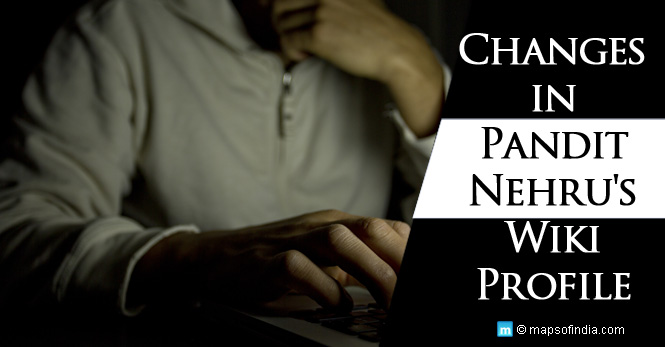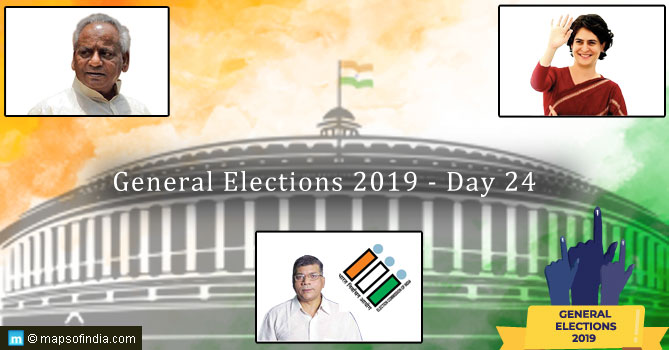 ‘Mischievous’ changes were made to India’s first Prime Minister Jawaharlal Nehru’s Wikipedia profile by an anonymous person on 26 June 2015. It was immediately noticed by a software designed to highlight such anonymous changes. We all know Wikipedia to be a platform for information content that is governed by Creative Commons Attribution, which offers anyone the right to add new information or add to existing content and use the available information free of charge. That’s what made Wikipedia so popular and continuously grow as a major source for content.
‘Mischievous’ changes were made to India’s first Prime Minister Jawaharlal Nehru’s Wikipedia profile by an anonymous person on 26 June 2015. It was immediately noticed by a software designed to highlight such anonymous changes. We all know Wikipedia to be a platform for information content that is governed by Creative Commons Attribution, which offers anyone the right to add new information or add to existing content and use the available information free of charge. That’s what made Wikipedia so popular and continuously grow as a major source for content.
So, why someone’s edit on Pandit Nehru’s profile raise so many eyebrows and evoke such a passionate protest? Isn’t that supposed to be a norm when it comes to Wikipedia? Well, the act is controversial on three counts. Firstly, it was an anonymous editor who made the changes. The Wiki editors must disclose their identity. Secondly, the changes were downright malicious as was the intent, and aimed at a person respected by many in India. Thirdly, the source of the IP address from where the changes were made was traced back to an IP address belonging to National Informatics Centre (NIC), a central government agency for web services.
The Malicious Changes
The anonymous editor tried to stoke controversy by mentioning Pandit Nehru’s grandfather as being a Muslim who adopted a Hindu name to escape British persecution. The change mentioned that Pandit Gangadhar Nehru was actually Ghiasuddin Ghazi, who later changed his name to Gangadhar Nehru.
The edit further went on to claim that he was born in a red light area of Allahabad. It did not stop there. The changes then targeted Pandit Nehru himself and made derogatory and vulgar remarks about his alleged relationship with Edwina Mountbatten, the wife of India’s last Viceroy under British rule and India’s first Governor General, Lord Mountbatten.
The Reaction
In an immediate and expected response, Randeep Surjewala, the Congress Party spokesperson, denounced the attempt to malign the reputation of one of India’s most popular freedom fighters. He demanded an explanation from PM Modi on how a government IP address was used, who was behind it, and on whose instructions were the changes made.
The Debate
The unsavoury episode raises several questions that must be debated.
Firstly, should anyone be allowed to access a free and open platform like Wikipedia and make any changes? The question has wider implications. Isn’t there a contradiction between a person’s freedom to express an opinion versus another’s right to privacy? What if the targeted person, as in Pandit Nehru’s or his grandfather’s case, is no more? Does that give another person a right to state a supposed fact or express an opinion about the other person?
Wikipedia is essentially an information and not opinion platform. However, any historical person or event may involve several opinions and interpretations on facts, and in many cases, what is or isn’t a ‘fact’ itself is a matter of debate. So, who gets the right to edit on Wikipedia and display information which may or may not be factual? Also, how does information, as in this episode, be segregated between fact, fiction and opinion?
Why should the information whether Pandit Gangadhar Nehru was or wasn’t a Muslim be dependent on an anonymous editor who may or may not know the fact? And is that information relevant today? What if the change had not been noticed? What if the ‘edited’ version had been used to quote in another article by someone with a credible background?
The problem with history is that such information can have implications in today’s world, given the state of politics and social divide. The reaction may vary between societies and nations depending on how socially and politically mature they are. Which brings us back to the core issue – who is to judge?
Secondly, the intent of the editor is critical. In a polarised world like ours, an event like this could trigger a social, political or religious backlash, as we saw in the Charlie Hebdo case. What if the cartoon on the Prophet was published in Wikipedia and the IP was traced to some teenage juvenile who probably did it just for fun? What about the resulting consequences? That brings us back to the debate between freedom to express, the right to judge and the right to privacy.
What may seem justified for one may be a case of injustice to another, especially when it involves a person and a universally accessed platform like Wikipedia. The question remains open and debatable on who shall moderate content on Wikipedia. Shall this be done by a group of internationally recognised and established editors? But what about their social or cultural beliefs or political leanings? Isn’t that subject to influence? And why should their interpretation of an event or person be universally acceptable to all?
This argument becomes even more relevant when socially debatable events are published. Take the instance of controversial issues or events relating to laws on abortion and gay relationships. These are still widely debatable issues in many parts of the world. So, how can the content uploaded on Wiki be acceptable as the ‘true’ fact by all individuals and societies?
That brings us to the last issue. How does a government IP get used to carry out the change, as happened on 26 June? There is no debate on the fact that it must be condemned and adequate checks and balances introduced so that in future no government IP can be misused to pursue a personal agenda. The government must initiate a fair and transparent investigation into the episode and also introduce security measures to ensure such an incident never happens again.
The Pandit Nehru incident has raised several questions that require urgent answers, if Wikipedia has to continue as a credible source of information available to all. What’s your stand on it?
Read more:
Jawaharlal Nehru as Prime Minister
Economic Policies of Jawaharlal Nehru
Jawaharlal Nehru as a Social Reformer
Nehru’s role in the Freedom of India





